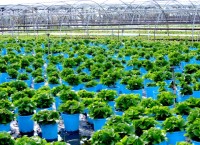It can very frustrating when your garden produce is ready and before harvesting, something else finds it first and eats all your hard work. It’s important to keep your garden food and produce safe from pests and problems that may affect the quality and quantity of your harvest. Every garden is prone to pests and diseases – caterpillars, fungal infections, dogs, beetles, deer and the list is endless. Fortunately, you can protect your garden from these predators without spending a fortune or risking your life and that of your family.
Step1 – The first thing to consider when gardening is to ensure that your plants are healthy and strong. A plant that is grown with all the appropriate tools and requirements can withstand pests better than a weak growing plant. Aerate your soil and ensure it’s well fed with the right nutrients before planting your crops. Organic manure like green farmyard manure is a great matter that can help to boost the nutrients of the soil.
Step 2 – Most pests are transitory problems and before you decide to use that spray, you may want to protect your crops with a trap, a barrier or a mesh. There many mechanical methods in the market and you can also device your own method to keep off wildlife from your plants. It’s important to first consider the type of pests that attack certain plants before erecting a barrier – for example, you don’t’ need to use closely knit mesh over plants that need access to insects that pollinate because your crops may fail to bare fruits.
Step 3 – You might want to use slug barriers or beer traps to protect your plants against slugs and snails. You can find lots of tips on how to set slug and snail traps from different online experts.
Step 4 – When the pests have attacked and you have no alternative but to use pesticides, always ensure that you buy the appropriate pesticide for the right plant. For example, you can knock off sucking pests by using contact insecticides and the effects are immediate and don’t last for more than 2 hours. Always check the label to be sure that the pesticide can be used on your plant and still observe harvest intervals.
Other Control Measures
- Choose disease-resistant plants – Buy your seedlings from recommended sources and ensure that the plants are disease-resistant. Talk to reliable gardening centers and nursery experts. When planting, ensure that the plants are well spaced to avoid creating moisture that will help fungus to grow and spread fast. Avoid overhead watering and keep the leaves as dry as possible and don’t allow the leaves to contact the soil. Check for sick plants when making rounds, pluck them from the garden and burn them. Always rotate your crops each year to avoid disease causing organisms from multiplying.
- Insect Control – not all insects like ants can destroy your plants completely call ant control Toronto. Bees are particularly important for pollination. Some insects can destroy other insects like the lady beetle for example, can control aphids. Always avoid using powerful insecticides because they end up destroying good bugs. Check the chemical label and ensure its nontoxic and environmentally friendly.
